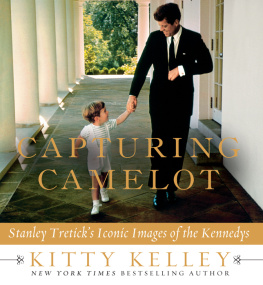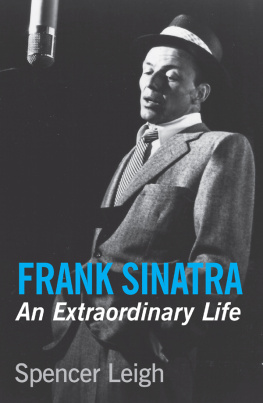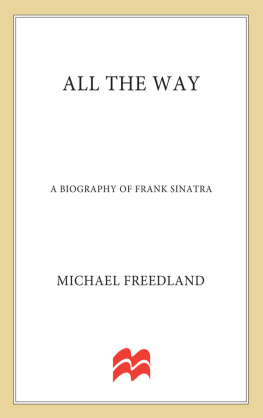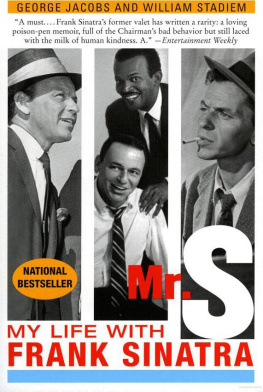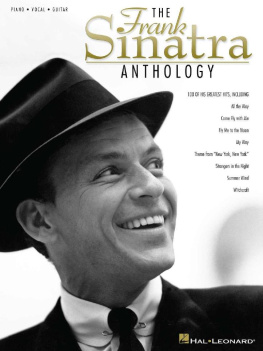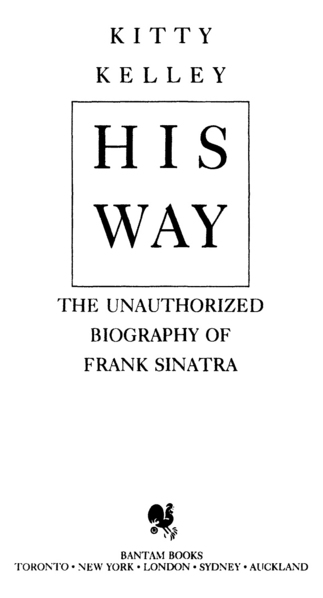HIS WAY
THE UNAUTHORIZED BIOGRAPHY
OF FRANK SINATRA
- The whole story of his childhood, which is far different than the one he invented.
- His beginnings as a skinny kid crooner who caused a bobby sox craze.
- His relationships with Harry James and Tommy Dorsey.
- His climb to the top as a singer and movie starand the scandal, violence and moodswings that followed.
- His trail of broken marriages to Nancy Sinatra, Ava Gardner and Mia Farrow.
- His on-going womanizing with the famous and unknown.
- The inside story of the rise and fall of the Rat Pack.
- His friendships with powerful Mafia figures.
- His public and private displays of verbal and physical abuse, both with and without his notorious bodyguards.
- His wildly lavish displays of generosity toward friends and charities.
- His vast influence that extends into the White House, today more than ever.
- The magnetism that still draws huge audiences worldwide.
THE NO-HOLDS-BARRED INSIDE LOOK
AT THE MAN, THE LEGEND, AND THE LIFE
OF FRANK SINATRA
HIS WAY: THE UNAUTHORIZED BIOGRAPHY OF FRANK SINATRA
A Bantam Nonfiction Book
Bantam hardcover edition / October 1986
Bantam paperback edition / September 1987
Grateful acknowledgment is made for permission to reprint the following:
The Man That Got Away (The Gal That Got Away) by Harold Arlen and Ira Gershwin. Copyright 1954 Harwin Music Co. renewed 1982 Harwin Music Co. International Copyright Secured. All Rights Reserved. Used by permission.
Richard Cory by Edward Arlington Robinson. Originally published by Charles Scribners Sons.
The still photograph from the motion picture Ship Ahoy copyright 1942 by Loews Incorporated. Copyright renewed 1969 by Metro-Golawyn-mayer Inc.
The still photograph from the motion picture Anchors Aweigh copyright 1945 by Loews Incorporated. Copyright renewed 1972 by Metro-Goldwyn-Mayer Inc.
All rights reserved.
Copyright 1986 by H.B. Productions, Inc.
No part of this hook may be reproduced or transmitted in any form or by any means, electronic or mechanical, including photocopying, recording, or by any information storage and retrieval system, without permission in writing from the publisher. For information address: Bantam Books.
Library of Congress Cataloging-in-Publication Data Kelley,
Kitty.
His way.
Bibliography:
I. Sinatra, Frank, 1915- 2. SingersUnited
StatesBiography. I. Title.
ML420.S565K4 1986 784.500924 [B] 85-48264
eISBN: 978-0-307-76796-7
Bantam Books are published by Bantam Books, a division of Bantam Doubleday Dell Publishing Group, Inc. Its trademark, consisting of the words Bantam Books and the portrayal of a rooster, is Registered in U.S. Patent and Trademark Office and in other countries. Marca Registrada. Bantam Books, 1540 Broadway, New York, New York 10036.
v3.1
To Stanley Tretick,
whose tireless efforts on behalf of this book
disprove his theory that photographers are a shiftless lot.
Reputation is what men and women think of us; Character is what God and angels know of us.
Thomas Paine
Contents
AUTHORS NOTE
I tried several times to interview Frank Sinatra for this book. Over a period of four years, I sent him several letters but received no response. I began calling and writing his publicist, Lee Solters. Again, no response. I then made several phone calls to Mr. Sinatras lawyer, Milton Rudin, and sent him several letters. On August 26, 1983, Mr. Rudin wrote me, saying he would be willing to arrange an appointment in his law office in Los Angeles. Apparently, he changed his mind.
On September 21, 1983, Frank Sinatra sued to stop this book from being published before a word was ever written. He filed suit in California seeking two million dollars in punitive damages from me for presuming to write without his authorization. He claimed that he and he alone, or someone he anointed, could write his life story, but no one else was allowed to do so. As he stated in his complaint: Sinatra has, on numerous occasions, informed his friends and publicly stated that at such time as he decides is appropriate, he will set the record straight as to many aspects of his life.
He further claimed that I was misrepresenting myself as his official biographer to get inside knowledge of the private aspects or events of [his] life. Asserting that I was misappropriating his name and likeness for commercial purposes, he asked the court to issue an injunction.
Fortunately a national coalition of writers groups rose up to protest this action, claiming that Frank Sinatras lawsuit against me was an assault upon all writers constitutionally protected freedom of expression and should be dismissed on its face. In a joint statement they said: The apparent goal behind Sinatras filing of this suit is to scare Ms. Kelley away from her investigation and, ultimately, to force her to scrap the book. Abuses of the judicial system such as these pose a serious threat to all writers.
Calling Sinatras lawsuit a chilling example of how a powerful public figure using money and influence can orchestrate what the public shall know about him, the coalition focused public attention on the rights guaranteed to all Americans under the First Amendment, even those people not approved of by Mr. Sinatra.
For one year, Sinatra pursued his lawsuit. His allegations proved groundless, and on September 19, 1984, he dropped the matter.
The writers groups applauded his action. The courts dismissal of this meritless suitat the request of Mr. Sinatrais a victory for all writers and the public, stated their press release. It reaffirms the right of the public to be informed about the lives of influential public persons whether or not they approve of the writer and his or her approach.
This coalition, which included the Reporters Committee for Freedom of the Press, Sigma Delta Chi (Society of Professional Journalists), the Newspaper Guild, PEN, the American Society of Journalists and Authors, the National Writers Union, the Council of Writers Organizations, and Washington Independent Writers, mobilized quickly and effectively to offer their support. Without them, I could never have written this book.
I am also grateful for the editorial support I received from the New York Daily News and the Baltimore Sun as well as Jules Feiffers brilliant cartoon in The Village Voice. Joseph Foote and Ronald Goldfarb in The Washington Post, Liz Smith in the New York Daily News, and William Safire in The New York Times wrote eloquently that censorship, no matter how you dress it up, is constitutionally impermissible. Such distinguished commentary deploring Mr. Sinatras attempt at prior restraint emphasized how important the press considers its right to cover public figures without restriction. As the Baltimore Sun stated: If all the public can learn of the person is what the person himself wants it to learn, then ours will become a very closed and ignorant society, unable to correct its ills, quite unlike what the drafters and subsequent generations of defenders of the free-speech First Amendment had in mind.
During this time I received the good counsel of several lawyers, including my father, William V. Kelley, his law partner, Duane Swinton, and his former associate, Irene Ringwood, of Witherspoon, Kelley, Davenport & Toole in Spokane, Washington; my personal attorney, Benjamin L. Zelenko of Landis, Cohen, Rauh and Zelenko in Washington, D.C.; and my California attorneys, William W. Vaughn and Robert C. Vanderet of OMelveny & Myers in Los Angeles.


